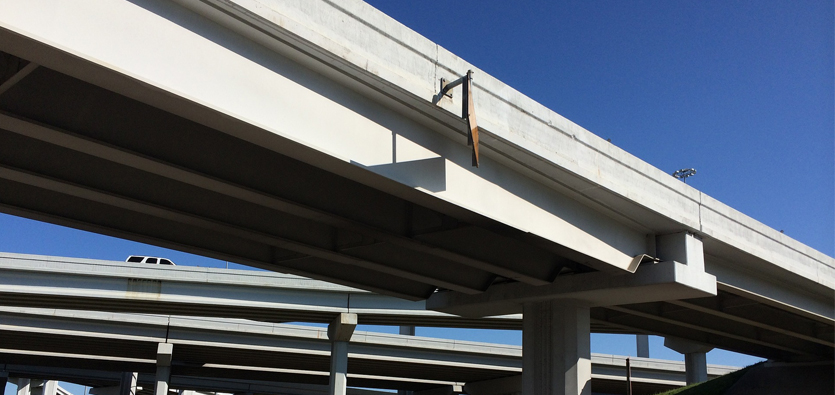Advanced polyurea technology has been used as a protective coating and waterproofing membrane for a variety of engineering and construction applications, including bridge deck waterproofing, for nearly thirty years. In fact, polyurea coatings have proven to be one of the most resilient, durable, long-lasting, impermeable, and reliable waterproofing membranes in the building industry.
Structures that lack the protection of polyurea coatings, or have more traditional protective coatings in place, are more likely to show signs of premature deterioration, rust, and other damages due to prolonged water exposure.
To maintain the structural integrity and safety of bridge decks, it’s important to apply a coating such as polyurea that’s guaranteed to withstand anything, and everything, Mother Nature throws at it.
Here’s what you need to know about bridge deck waterproofing.

Why Is Bridge Deck Waterproofing Important?
Bridges withstand a lot of heavy traffic, which often causes the concrete deck to develop tiny cracks. Cracks are bad news for any concrete structure because they allow water to seep into the deck and corrode the reinforcing steel. This deterioration can lead to inconvenient traffic interruptions and weakened structural integrity of the bridge, increasing the potential for hazardous situations such as partial or total collapse.
In addition, the steel supports that hold the bridge structure in place are also prone to rust and corrosion caused by environmental factors such as weather conditions, road salt, and steady usage if they’re not properly protected. That’s why keeping excess water, snow, ice, and salt away from bridge decks is immensely important in order protect the bridge and extend it’s lifespan.
One of the best ways to protect bridge decks from premature deterioration is through bridge deck waterproofing. Bridge deck waterproofing is the process of applying a protective, waterproof coating to the bridge deck to protect it from environmental and structural damages, such as corrosion and rust.
Bridge deck waterproofing can be applied during the bridge construction phase, or many years later as part of a restoration program.
Not only does bridge deck waterproofing prolong the lifespan of decks, but it can also save money in the long run reducing the need for costly maintenance and rehabilitation.
A number of different systems have been used in the past to protect bridge decks from corrosion and damages; however, these other systems often fail over time. Properly applied bridge deck waterproofing using a polyurea coating, on the other hand, ensures the bridge is safely waterproofed for many years and greatly extends the lifespan of the bridge compared to other waterproofing methods.
What Is Polyurea Waterproofing?
Polyurea coatings are fast-reacting protective barriers that form a durable and impenetrable membrane on a variety of material surfaces, including concrete and steel. They are formed as the result of a chemical reaction between either an aromatic or aliphatic isocyanate with an amine blend. The reaction takes place within a few seconds. For that reason, polyurea coatings in bridge deck waterproofing require specific spray application equipment and an expert team of applicators to do the job right.
Hot spray applied liquid polyurea waterproof coatings are the perfect solution for protecting bridge structures against external elements such as wind, rain, freezing rain, snow, ice, hail, and sleet. Using a simple plural component rapid application spray process, polyurea waterproofing can easily be applied and achieve gel time in a matter of seconds.
Compared to other protective coatings on the market, polyurea has an incredibly fast curing time. This allows for almost immediate resumption of foot traffic on the structure. In fact, general usage can resume within a day depending on the size of the bridge and the materials used.
Applying a waterproof polyurea protective coating to bridge decks can prevent foreseeable structural damages, loss of bridge access, and injuries. With proper maintenance, polyurea waterproofing prolongs the lifespan of the bridge structure and the materials it contains, including concrete and steel, for 30 years or more.
What Are the Advantages of Using Polyurea in Bridge Deck Waterproofing?
In addition to the extremely easy application and fast curing times, there are a number of reasons why polyurea coatings are the perfect solution for bridge deck waterproofing:
- Chemical resistance
- Abrasion resistance
- Excellent elongation and tensile strength
- Great crack-bridging ability
- Insensitive to humidity during the application process
- Excellent adhesion and coating performance for a variety of different substrates, including concrete, steel, wood, etc.
- Thermal stability to a wide range of temperature variations
- 100% solids with no solvents or VOCs, making it environmentally friendly
- Once fully cured, the finished product is a smooth, seamless, and strong membrane
- Vapour permeable, which prevents moisture accumulation
- Can be applied to vertical and curved surfaces to almost any desired thickness level without any sagging
- Thickness level can be selected and adjusted during application
Choose IMC Distributors for Bridge Deck Waterproofing Solutions
IMC Distributors is committed to providing top-quality polyurea waterproofing products that are suitable for a variety of applications, including bridge deck waterproofing and protection. We’re proud to be the sole provider of ISOMAT building materials in North America and stand by our polyurea waterproof coatings, which have fast reacting and curing properties with strong adhesion capabilities. These polyureas protect whatever structure they coat against the elements.
To learn more about our products and the advantages of polyurea coatings, please contact us or visit our website.
 Karli Logan is the Owner and President of IMC Distributors which is the exclusive partner of Nukote Coating Systems in Canada. With a B.Sc and M.Sc, as well as a demonstrated history of working across a number of industries, she has a passion to drive significant gains and benefits for IMC’s clients.
Karli Logan is the Owner and President of IMC Distributors which is the exclusive partner of Nukote Coating Systems in Canada. With a B.Sc and M.Sc, as well as a demonstrated history of working across a number of industries, she has a passion to drive significant gains and benefits for IMC’s clients.